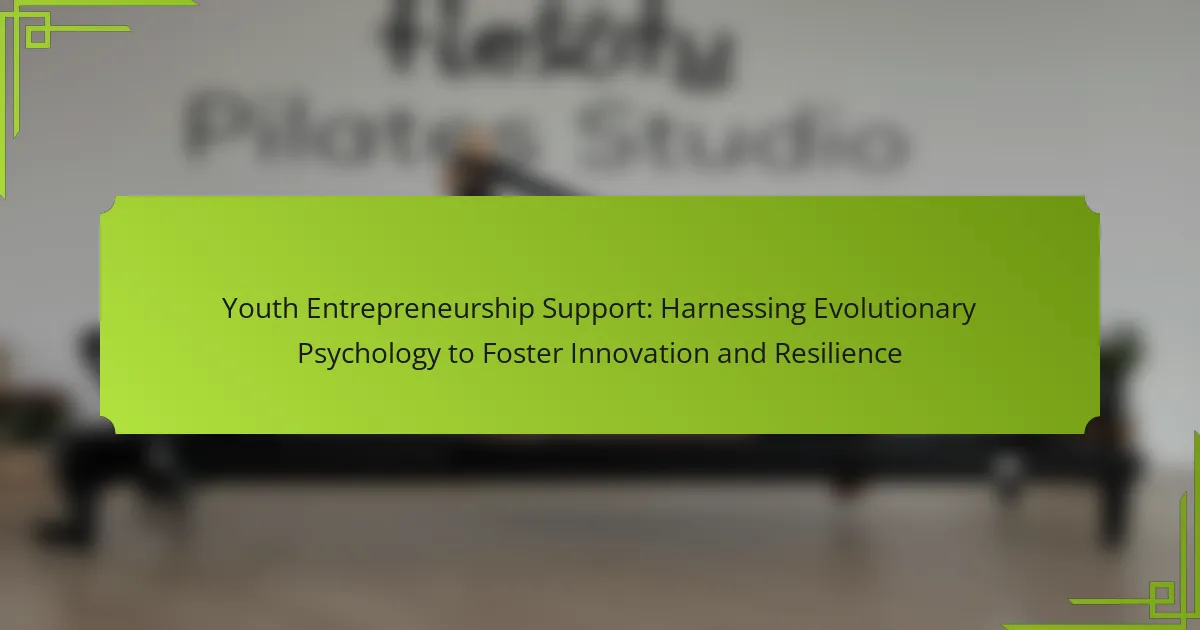Supporting youth entrepreneurship is vital for fostering innovation and resilience in a competitive landscape. This article explores how evolutionary psychology influences adaptability, creativity, and risk-taking. It also examines effective mentorship programs, funding access, and collaborative networks that enhance entrepreneurial success. By leveraging these insights, stakeholders can create robust support systems for young innovators.

How Does Evolutionary Psychology Influence Youth Entrepreneurship?
Evolutionary psychology significantly influences youth entrepreneurship by fostering innovation and resilience. This psychological framework helps young entrepreneurs leverage innate traits, such as adaptability and problem-solving, to navigate challenges effectively.
Research indicates that understanding evolutionary motivations can enhance creativity, as young entrepreneurs are more likely to pursue novel solutions when they recognise their biological predispositions. For example, studies show that youth who embrace risk-taking, a trait rooted in evolutionary survival strategies, often excel in entrepreneurial ventures.
Additionally, evolutionary psychology promotes social cooperation among young entrepreneurs, encouraging collaboration and networking. This sense of community can lead to shared resources and knowledge, ultimately driving innovation.
Incorporating these insights into entrepreneurship programs can significantly enhance youth resilience, enabling them to overcome setbacks and persist in their ventures. By aligning support structures with evolutionary principles, stakeholders can cultivate a robust environment for young entrepreneurs to thrive.
What are the key principles of Evolutionary Psychology relevant to entrepreneurship?
Evolutionary psychology offers insights into entrepreneurship by highlighting innate behaviours that drive innovation and resilience. Key principles include risk-taking behaviour, social cooperation, and adaptive problem-solving.
Risk-taking is essential for entrepreneurship, as it encourages individuals to explore new opportunities despite potential failures. Social cooperation fosters networking and collaboration, critical for resource sharing and support. Adaptive problem-solving enhances resilience, enabling entrepreneurs to navigate challenges effectively.
These principles align with the evolutionary need for survival and success in competitive environments, making them relevant for youth entrepreneurship support initiatives. By understanding these psychological underpinnings, programs can better nurture innovative thinking and resilience among young entrepreneurs.
How does understanding human behaviour enhance entrepreneurial resilience?
Understanding human behaviour enhances entrepreneurial resilience by enabling youth entrepreneurs to adapt to challenges. Insights from evolutionary psychology reveal that recognising emotional triggers and social dynamics fosters innovation. This adaptability is crucial in navigating market fluctuations and consumer needs. Moreover, understanding behavioural patterns allows for strategic risk-taking, essential for sustained growth. By leveraging these insights, young entrepreneurs can build a resilient mindset, ultimately driving long-term success.

What Universal Attributes Support Youth Entrepreneurship?
Youth entrepreneurship is supported by attributes such as mentorship, access to funding, and educational resources. These elements foster innovation and resilience among young entrepreneurs. Mentorship provides guidance and networking opportunities, while funding enables the realisation of business ideas. Educational resources enhance skills and knowledge essential for navigating challenges. Together, these universal attributes create a robust ecosystem that encourages youth to pursue entrepreneurial ventures.
What role does motivation play in youth entrepreneurship?
Motivation is crucial in youth entrepreneurship as it drives innovation and resilience. Motivated young entrepreneurs are more likely to take risks, pursue opportunities, and overcome challenges. Research shows that intrinsic motivation, such as passion and purpose, significantly enhances their ability to innovate. Furthermore, motivation fosters resilience, enabling them to navigate setbacks and persist in their entrepreneurial journeys. By leveraging evolutionary psychology, programs can enhance motivation, leading to greater success in youth entrepreneurship.
How does social influence shape entrepreneurial decisions?
Social influence significantly impacts entrepreneurial decisions by shaping perceptions, motivations, and behaviours. Peer networks and role models often inspire youth entrepreneurs, fostering innovation and resilience. For example, supportive social environments can enhance confidence and risk-taking, essential attributes for entrepreneurial success. Studies show that young entrepreneurs with strong social ties are more likely to pursue their ventures and adapt to challenges.
What are the common psychological barriers faced by young entrepreneurs?
Young entrepreneurs commonly face psychological barriers such as fear of failure, lack of confidence, and social anxiety. These barriers hinder their ability to innovate and take risks. Fear of failure can lead to avoidance of opportunities, while lack of confidence diminishes their decision-making capabilities. Social anxiety may prevent them from networking effectively, limiting access to resources and support. Addressing these psychological challenges is crucial for fostering resilience and promoting successful youth entrepreneurship.

What Unique Attributes Foster Innovation in Young Entrepreneurs?
Unique attributes that foster innovation in young entrepreneurs include adaptability, creativity, and resilience. Adaptability allows them to navigate changing market conditions. Creativity drives unique ideas and solutions. Resilience helps them overcome failures and setbacks. These attributes create a robust foundation for innovative thinking and entrepreneurial success.
How can risk-taking behaviour be harnessed for entrepreneurial success?
Risk-taking behaviour can be harnessed for entrepreneurial success by fostering a culture of innovation and resilience among youth. Encouraging calculated risks allows young entrepreneurs to experiment, learn from failures, and adapt strategies. This approach nurtures creativity and problem-solving skills, essential for navigating the dynamic business landscape. Research shows that youth who engage in risk-taking are more likely to develop unique business ideas and solutions, ultimately driving economic growth. By integrating evolutionary psychology principles, support programs can enhance risk tolerance, empowering youth to pursue entrepreneurial ventures with confidence.
What cognitive biases can impact youth entrepreneurship positively?
Cognitive biases can positively impact youth entrepreneurship by enhancing creativity, risk-taking, and decision-making. Optimism bias encourages young entrepreneurs to pursue innovative ideas despite challenges. The bandwagon effect fosters collaboration, as youth are influenced by peers, leading to shared resources and support. Availability heuristic helps them identify opportunities based on recent experiences, promoting proactive engagement. Lastly, loss aversion drives resilience, as young entrepreneurs strive to avoid failure, motivating them to adapt and innovate continuously.

What Rare Attributes Contribute to Entrepreneurial Success?
Youth entrepreneurship success often hinges on rare attributes like adaptability, creativity, and emotional intelligence. These traits enable young entrepreneurs to navigate challenges and seize opportunities. For instance, adaptability allows for quick pivots in response to market changes, enhancing resilience. Creativity fosters innovative problem-solving, essential for standing out in competitive landscapes. Emotional intelligence aids in building strong networks and understanding consumer needs, crucial for sustained growth. Emphasising these rare attributes can significantly enhance the support systems designed for youth entrepreneurs, ultimately driving innovation and success.
How do evolutionary instincts shape long-term business strategies?
Evolutionary instincts significantly influence long-term business strategies by fostering adaptability and innovation. These instincts drive entrepreneurs to identify opportunities and respond effectively to market changes.
Understanding the psychological underpinnings of risk-taking and resilience can enhance youth entrepreneurship support. For instance, evolutionary psychology emphasises the importance of social collaboration, which can be leveraged to cultivate networks that encourage innovative thinking.
Moreover, recognising the innate human drive for survival and success can help develop strategies that prioritise sustainable growth. By aligning business goals with these evolutionary instincts, young entrepreneurs can build more resilient and adaptable ventures.
Incorporating these insights into support programs can lead to improved outcomes for youth entrepreneurs, fostering a culture of innovation that thrives on the principles of evolutionary psychology.
What uncommon psychological traits are found in successful young entrepreneurs?
Successful young entrepreneurs often exhibit uncommon psychological traits such as high resilience, intrinsic motivation, and a unique risk tolerance. These traits foster innovation and adaptability in challenging environments. Resilience enables them to navigate failures, while intrinsic motivation drives their passion for creating impactful solutions. Unique risk tolerance allows them to embrace uncertainty, facilitating bold decision-making.

How Can Evolutionary Psychology Guide Practical Support Strategies?
Evolutionary psychology can guide practical support strategies for youth entrepreneurship by fostering innovation and resilience. It emphasises understanding innate human behaviours and motivations, helping to create environments that nurture entrepreneurial skills.
Support strategies can include mentorship programs that leverage social bonding, fostering collaboration among young entrepreneurs. Additionally, promoting risk-taking in a safe context encourages resilience, allowing youth to learn from failures.
By applying evolutionary psychology principles, programs can enhance creativity and adaptability, essential traits for entrepreneurship. Tailoring support to these psychological insights can significantly improve outcomes for young innovators.
Incorporating these strategies can lead to a more robust entrepreneurial ecosystem, empowering youth to thrive in competitive landscapes.
What mentorship approaches align with psychological principles?
Mentorship approaches that align with psychological principles include experiential learning, cognitive-behavioural techniques, and social learning theory. These methods foster innovation and resilience in youth entrepreneurship.
Experiential learning emphasises real-world experiences, allowing mentees to engage in practical problem-solving. Cognitive-behavioural techniques help in developing a growth mindset, enabling youth to overcome challenges. Social learning theory underscores the importance of role models, promoting observational learning and collaborative skills.
Integrating these approaches enhances the effectiveness of mentorship programs, driving entrepreneurial success.
How can educational programs integrate psychological insights for better outcomes?
Integrating psychological insights into educational programs enhances youth entrepreneurship support by fostering innovation and resilience. Evolutionary psychology emphasises understanding human behaviour, which can inform teaching methods and curriculum design.
Programs that leverage psychological principles can cultivate an entrepreneurial mindset. For example, incorporating growth mindset theories encourages students to embrace challenges and learn from failures. This approach builds resilience, essential for navigating the uncertainties of entrepreneurship.
Additionally, understanding intrinsic motivation can guide program structure. Programs that align with students’ interests and passions increase engagement and creativity. By fostering an environment that values collaboration and peer support, educational programs can enhance innovation among young entrepreneurs.
Lastly, integrating psychological assessments can identify individual strengths and weaknesses, tailoring support to maximise potential. This personalised approach ensures that educational programs effectively nurture the entrepreneurial spirit in youth.
What models of support have proven effective?
Effective models of support for youth entrepreneurship include mentorship programs, incubators, and access to funding. Mentorship fosters resilience by providing guidance from experienced entrepreneurs. Incubators offer resources and networking opportunities that enhance innovation. Access to funding, through grants or loans, enables young entrepreneurs to launch and sustain their ventures. Each model addresses specific challenges faced by youth, promoting sustainable growth and development in entrepreneurship.
What common mistakes should be avoided in youth entrepreneurship support?
To effectively support youth entrepreneurship, avoid these common mistakes. Failing to understand the unique psychological needs of young entrepreneurs can hinder their innovation and resilience. Neglecting mentorship opportunities limits their growth potential. Providing insufficient resources, such as funding and training, can stifle their initiatives. Lastly, overlooking the importance of networking restricts their access to valuable connections and collaboration.

What Best Practices Can Enhance Youth Entrepreneurship Initiatives?
Youth entrepreneurship initiatives can be enhanced by implementing best practices that foster innovation and resilience. These practices include mentorship programs, access to funding, and collaborative networks.
1. Mentorship programs connect young entrepreneurs with experienced professionals, providing guidance and support.
2. Access to funding sources, such as grants and microloans, empowers youth to start and grow their businesses.
3. Collaborative networks encourage sharing of resources and ideas, creating a supportive community.
4. Educational workshops on business skills and psychological resilience equip youth with necessary tools for success.
These strategies leverage evolutionary psychology principles, promoting adaptability and creativity in young entrepreneurs.
How can communities foster a supportive environment for young entrepreneurs?
Communities can foster a supportive environment for young entrepreneurs by providing mentorship, resources, and networking opportunities. Mentorship programs connect experienced entrepreneurs with youth, offering guidance and practical insights. Access to resources, such as funding, workspace, and educational workshops, enhances skill development. Networking events facilitate connections, allowing young entrepreneurs to share ideas and collaborate. Additionally, fostering a culture of innovation and resilience encourages experimentation and risk-taking among youth.
What strategies promote psychological resilience among young business owners?
Fostering psychological resilience among young business owners requires targeted strategies. These include mentorship programs, which provide guidance and support, and stress management workshops that equip them with coping techniques. Networking opportunities enhance social connections, while goal-setting frameworks promote a sense of achievement. Lastly, fostering a growth mindset encourages adaptability and learning from failures.
How can feedback loops improve entrepreneurial learning and growth?
Feedback loops enhance entrepreneurial learning and growth by facilitating continuous improvement. They allow youth entrepreneurs to reflect on experiences, adapt strategies, and innovate based on real-time data. This iterative process fosters resilience, encouraging experimentation and risk-taking. As a result, entrepreneurs develop a deeper understanding of market needs and personal strengths, leading to sustainable growth. Emphasising feedback loops cultivates a culture of learning, essential for thriving in dynamic environments.
What actionable tips can be applied immediately to support young entrepreneurs?
Young entrepreneurs can implement several actionable tips to enhance their innovation and resilience. First, cultivate a growth mindset by embracing challenges and learning from failures. Second, establish a strong support network of mentors and peers to share experiences and resources. Third, prioritise time management by setting clear goals and deadlines. Fourth, leverage technology and digital tools to streamline operations and reach wider audiences. Lastly, practice self-care to maintain mental well-being and sustain motivation.
